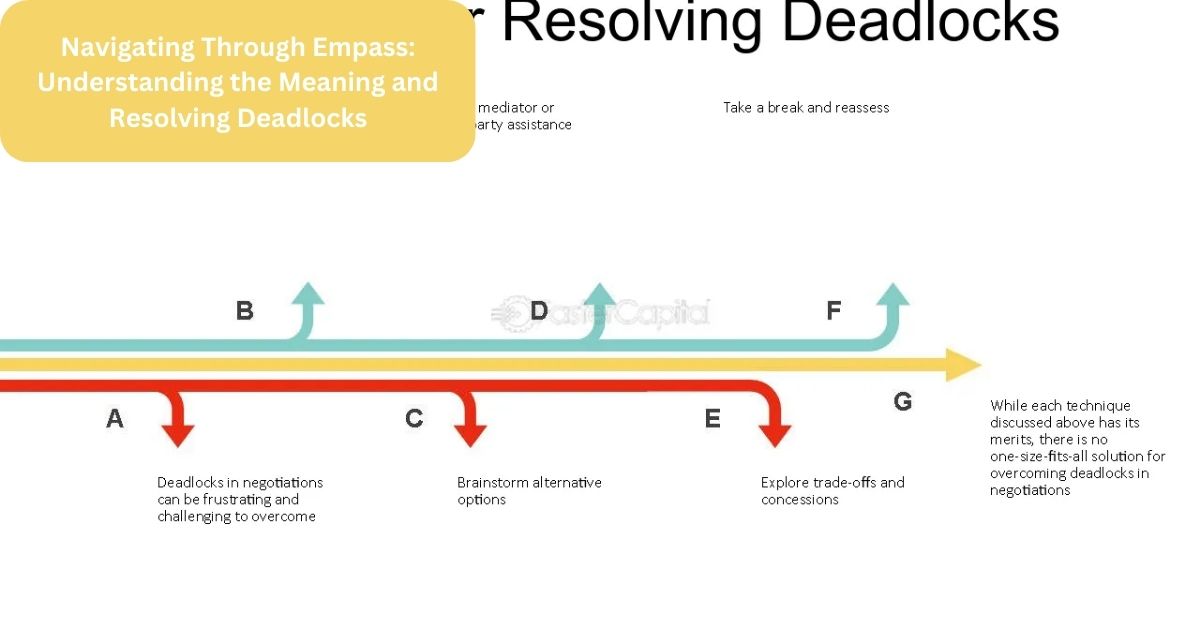In various aspects of life, encountering an impasse is inevitable. An impasse signifies a standstill, a dead end where progress seems unattainable.
Whether it’s in negotiations, personal relationships, or professional endeavors, navigating through an impasse requires tact, resilience, and strategic thinking.
In this comprehensive guide, we’ll delve into the meaning of an impasse and explore effective strategies to overcome it, ensuring you can steer past deadlocks and move towards favorable outcomes.
Introduction: Unraveling the Conundrum of Empass
In the realm of challenges and obstacles, the term “empass” stands as a formidable barrier, embodying a situation where progress comes to a halt.
Understanding its nuances is crucial for devising strategies to navigate through such deadlocks effectively.
Exploring the Depths of Empass:
1. Deciphering Empass: Delving Into its Meaning
Empass, pronounced as /ˈæmpɑːs/, encapsulates the essence of an impasse, a deadlock that obstructs forward movement. It represents an insurmountable difficulty, often resulting in a stalemate where conflicting forces reach a standstill.
2. The Anatomy of Stalemate: Understanding the Dynamics
Stalemates are intricate phenomena, characterized by a state of equilibrium where neither party can make a decisive move. Such situations arise due to various factors, including conflicting interests, lack of consensus, or external constraints.
3. Breaking Down Barriers: Strategies to Overcome Empass
Navigating through empass requires a combination of strategic planning, negotiation skills, and creative problem-solving approaches. Employing mediation, compromise, or seeking alternative pathways can facilitate progress even in the most challenging situations.
Strategies to Overcome an Impasse:
Overcoming an impasse demands a blend of strategic thinking, creativity, and interpersonal skills. Let’s explore six key strategies to navigate through impasses successfully.

1. Foster Open Communication:
Communication lies at the heart of resolving conflicts and overcoming impasses. Foster an environment conducive to open dialogue, where all parties can express their concerns, perspectives, and aspirations freely.
2. Seek Common Ground:
Amidst differing opinions and conflicting interests, seek common ground that bridges divides. Identify shared objectives or mutual benefits that can serve as a foundation for compromise and collaboration.
3. Explore Alternative Solutions:
In the face of an impasse, rigid adherence to initial plans or solutions may prove futile. Embrace flexibility and creativity by exploring alternative avenues and innovative solutions that circumvent the deadlock.
4. Engage in Mediation:
Mediation can serve as a valuable tool in resolving impasses, especially in situations involving multiple stakeholders or complex dynamics. A neutral mediator can facilitate constructive discussions, paving the way for consensus and resolution.
5. Focus on Long-Term Goals:
Amidst the immediacy of an impasse, it’s crucial to maintain focus on long-term goals and overarching objectives. Evaluate the significance of the deadlock in the broader context, prioritizing sustainable solutions over short-term wins.
6. Embrace Patience and Perseverance:
Overcoming an impasse seldom happens overnight. Embrace patience and perseverance as you navigate through challenges and setbacks. Stay committed to the process, trusting that persistence will eventually lead to breakthroughs.
Practical Application: Overcoming Impasses in Negotiations
Negotiations often serve as fertile ground for impasses to emerge. Let’s apply the strategies discussed above to navigate through impasses in negotiation scenarios effectively.
Identifying Common Interests:
In negotiations, identifying common interests forms the cornerstone of progress. By focusing on shared objectives or mutual gains, negotiators can transcend differences and find common ground, steering clear of impasses.
Exploring Creative Solutions:
When negotiations reach an impasse, it’s essential to explore creative solutions that address underlying concerns while accommodating diverse interests. Brainstorming sessions and collaborative problem-solving can yield innovative alternatives, breaking the deadlock.
The Role of Communication: Fostering Dialogue Amidst Deadlocks
Effective communication serves as a linchpin in resolving impasses. By fostering open dialogue, clarifying perspectives, and finding common ground, stakeholders can transcend differences and pave the way for constructive outcomes.

Harnessing Creativity: Innovative Solutions for Complex Deadlocks
Innovation often thrives in adversity. By encouraging out-of-the-box thinking, exploring unconventional solutions, and embracing flexibility, individuals and organizations can navigate through empass with resilience and ingenuity.
Empowering Decision-Making: Empass as a Catalyst for Growth
Contrary to being a roadblock, empass can serve as a catalyst for growth and transformation. By reframing challenges as opportunities, embracing uncertainty, and making informed decisions, individuals can emerge stronger and more resilient.
The Psychological Impact: Coping with Stress and Uncertainty
Deadlocks can exert significant psychological tolls, leading to stress, frustration, and anxiety. Implementing stress management techniques, seeking support networks, and maintaining a positive mindset are essential for navigating through turbulent times.
Learning from History: Case Studies of Successful Resolution
History provides valuable insights into overcoming empass. Studying past conflicts, peace negotiations, and diplomatic resolutions offers valuable lessons and inspiration for addressing contemporary challenges.
Legal Perspectives: The Role of Mediation and Arbitration
Legal frameworks provide mechanisms for resolving disputes and overcoming impasses. Mediation, arbitration, and alternative dispute resolution mechanisms offer viable pathways for achieving consensus and mitigating conflicts.
Global Implications: Empass in International Relations
In the arena of international relations, empass poses significant challenges to diplomacy and peacebuilding efforts. Addressing geopolitical deadlocks requires multilateral cooperation, diplomatic dialogue, and conflict resolution strategies.
Ethical Considerations: Upholding Integrity Amidst Deadlocks
Ethical principles serve as guiding beacons in navigating through empass. Upholding integrity, fostering transparency, and prioritizing the common good are essential for preserving trust and credibility amidst conflicts.
Conclusion: Embracing Challenges as Opportunities for Growth
In conclusion, empass may present formidable challenges, but it also offers opportunities for growth, innovation, and transformation.
By leveraging strategic approaches, effective communication, and collaborative efforts, individuals and organizations can transcend deadlocks and chart a course towards progress and prosperity.
FAQ’s:
Q. What is the primary characteristic of empass?
Empass is characterized by a deadlock or stalemate, where progress is obstructed due to insurmountable difficulties or conflicting interests.
Q. How can stakeholders overcome empass effectively?
Stakeholders can overcome empass by employing strategic planning, effective communication, creativity, and a collaborative approach to problem-solving.
Q. What role does leadership play in navigating through empass?
Leadership plays a crucial role in inspiring change, fostering collaboration, and steering individuals and organizations towards resolving deadlocks effectively.
Q. Are there historical precedents of successful resolution of empass?
Yes, history provides numerous examples of successful resolution of empass through diplomatic negotiations, conflict resolution mechanisms, and peacebuilding efforts.
Q. What ethical considerations are essential in addressing empass?
Upholding integrity, fostering transparency, and prioritizing the common good are essential ethical considerations in navigating through empass.
How can individuals cope with the psychological impact of empass? Coping mechanisms such as stress management techniques, seeking support networks, and maintaining a positive mindset are crucial for navigating through the psychological impact of empass.







